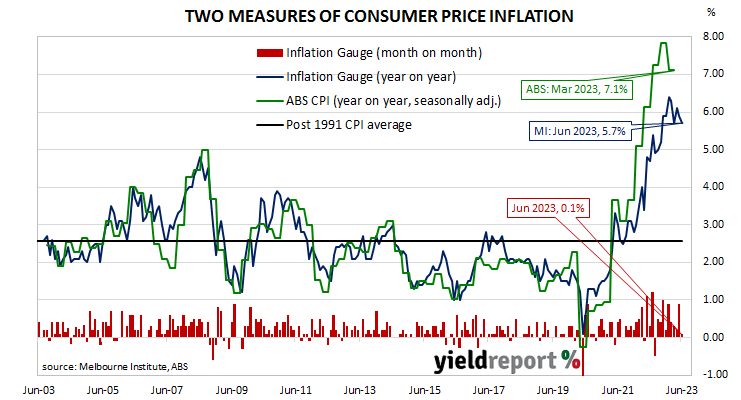Summary: Melbourne Institute Inflation Gauge index up 0.1% in June; up 5.7% on annual basis; ACGB yields down; rate-rise expectations soften.
The Melbourne Institute’s Inflation Gauge is an attempt to replicate the ABS consumer price index (CPI) on a monthly basis. It has turned out to be a reliable leading indicator of the CPI, although there are periods in which the Inflation Gauge and the CPI have diverged for as long as twelve months. On average, the Inflation Gauge’s annual rate tends to overestimate the ABS rate by around 0.1%, at least until recently.
The Melbourne Institute’s latest reading of its Inflation Gauge index indicates consumer prices increased by just 0.1% in June, following increases of 0.9% and 0.2% in May and April respectively. The index rose by 5.7% on an annual basis, down from May’s comparable figure of 5.9%.
The figures came out on the same day as several other reports and Commonwealth Government bond yields fell noticeably. By the close of business, 3-year and 10-year ACGB yields had both decreased by 6bps to 3.93% and 3.96% respectively while the 20-year yield finished 8bps lower at 4.22%.
In the cash futures market, expectations regarding further rate rises softened. At the end of the day, contracts implied the cash rate would rise from the current rate of 4.07% to average 4.135% in July and then to 4.275% in August. February 2024 contracts implied a 4.505% average cash rate while May 2024 contracts implied 4.45%, 38bps more than the current rate.
Given the Inflation Gauge’s tendency to overestimate, the latest figures imply an official CPI reading of 0.4% (seasonally adjusted) for the June quarter or 5.6% in annual terms. However, it is worth noting the annual CPI rate to the end of March was 7.1% while the Inflation Gauge had implied a 5.6% annual rate at the time.


